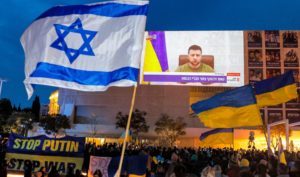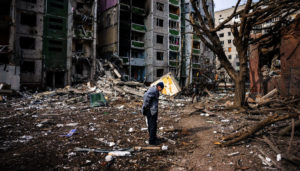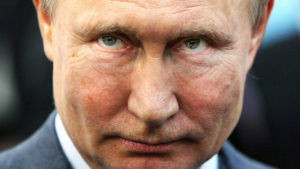The first month of President Putin’s most recent invasion of Ukraine has not gone according to plan: the initial drive to Kyiv has stalled; his forces have sustained heavy losses; support from his inner circle has been tentative or lacking.
But despite this bleak picture, one man has stood firm in his support for the invasion, both financially and with man-power: Ramzan Kadyrov.
Kadyrov is the governor of Chechnya, the small region in the North Caucasus that has repeatedly fought for its independence against Russian rule. Putin reintegrated the region in the early 2000s with the help of Kadyrov’s father, Akhmad. Following the assassination of Akhmad in 2004 by Chechen Islamists, Kadyrov developed a close relationship with Putin, frequently likened to that of father and son. He eventually took over as the head of Chechnya in 2007, receiving the Russian president’s full backing.
The personalist nature of this relationship is crucial: Kadyrov’s loyalty does not extend to the government or Russia, it is only to Putin himself. This has meant that Kadyrov has grown bolder throughout his rule, clashing with security services and even flouting federal policies. Suffice it to say, support for Kadyrov in the Kremlin does not reach much further than the president’s office. This history is important for evaluating the size of the gamble Kadyrov is taking in his support for the invasion, and what he has already gained.
In Chechnya itself, Kadyrov’s rule is characterised by brutal, indiscriminate violence. His campaign to purge the republic of its LGBTQ community, part of a policy of extrajudicial executions, is well-documented. At the start of this year, he embarked on his anti-dissident war with renewed vigour, conducting mass kidnappings of critics’ relatives. This included violently abducting Zarema Musaeva, the mother of a Chechen human rights lawyer, from Nizhny Novgorod in January; she is still held by police.
This violence has been carried out by the Chechen security services, known as the kadyrovtsy, which operate as Kadyrov’s personal army. These units rarely leave Chechnya, and even then, only for training exercises. Kadyrov mobilised his top commanders and units at the beginning of February, sending them to the staging areas near the Belarusian-Ukrainian border. Moving as one large group, the units known to be involved in the invasion are the “Sever” and “Yug” Battalions (“North” and “South,” respectively), the “Akhmat-Grozny” riot (OMON) police unit, and the “Akhmat” rapid-response (SOBR) police unit.
Allegedly deployed on March 22nd is the Akhmat Kadyrov Police Regiment, the most notorious in Chechnya, and possibly in Russia. This is the unit largely responsible for the extrajudicial executions and the anti-LGBTQ purges. While Kadyrov claims they are now in Ukraine, he has faked their deployment before, and they just returned from a SWAT competition in the UAE.
The most important leader within these units is Magomed Tushaev, commander of “Sever” Battalion. While his counterpart in the “Yug” Battalion, Khusein Mezhidov, has appeared more prominently in propaganda clips, Tushaev played a more significant role in the psychological warfare during the military buildup and the initial days of the invasion, stemming from the brutal reputation developed by Tushaev’s unit during counterterrorism operations in Chechnya.
Tushaev was rumoured to have been killed on February 26th, the kadyrovtsy’s worst day of casualties. It soon transpired that he was, in fact, alive, yet many of Kadyrov’s opponents abroad keep repeating it, allowing Tushaev’s presence to continuously make them look foolish.
In addition to these units’ leaders, Kadyrov sent in his cousins: brothers Sharip Delimkhanov, commander of Rosgvardia in Chechnya, and Alibek Delimkhanov, deputy commander of Rosgvardia’s North Caucasus forces. Their final brother, Adam, is a Duma parliamentarian from Chechnya who is now overseeing the kadyrovtsy’s operations in Mariupol. These units were engaged near Kyiv but could not take sufficient ground to carry out their objective: assassinating President Zelenskyy. Accordingly, Kadyrov pulled them back to Chechnya, deploying new, unidentified units near Mariupol under the leadership of Adam Delimkhanov. These reinforcements also failed the crucial task of taking the Azovstal metallurgy plant, which instead had to be bombed.
Kadyrov’s financial backing for the invasion has come from the Akhmat Kadyrov Fund (AKF), his family’s private slush fund. It was primarily created by embezzling federal subsidies to the republic and racketeering businesses and state employees. As part of the war effort, the AKF has supplied food and equipment to his troops on the frontlines, as well as military vehicles to the authorities of the so-called Donetsk and Luhansk People’s Republics. He has also used his corrupt slush-fund to provide humanitarian aid to the residents of Melitopol, which is under Russian occupation.
The invasion may still be in its infancy, but a number of consequences of Kadyrov’s gamble are already visible. Most obviously, his information war has proved a success. He continuously makes his critics look foolish about the fact that Tushaev is alive, and he has been able to stage rallies in support of the invasion far beyond Chechnya. Kadyrov’s simultaneous campaign to court the Arabic-speaking world has also helped keep Saudi Arabia and the United Arab Emirates from siding against Russia in the pitched economic battle. For Putin, at least, this is enough to justify his decision to make Kadyrov Russia’s chief diplomatic emissary to the Muslim world — even if it does backfire when he prioritises Muslim issues over Kremlin policy, such as with his support for the Ronhingya.
In elite politics, Kadyrov is also coming out ahead. His strong support for Putin, when others were more hesitant, is a clear win. The domestic turmoil in both the FSB and Rosgvardia — exacerbated by American and Ukrainian intelligence disclosures pointing to leaks from the security services — plays to his advantage. Kadyrov’s long-running feud with federal security service leadership means that, the more endangered their futures become, the more secured his is.
Yet not everything is going to plan. For all his propaganda victories, Kadyrov’s biggest loss is that the kadyrovtsy’s reputational bubble has burst. Almost everyone, except the Chechen propaganda circus, has noted that his army has not engaged in fighting, but has still sustained significant casualties. This is likely to embolden his opponents among the Russian political elite, who may fear him a little less, making increased confrontation possible.
In Chechnya, too, his position will be weakened. There currently are and will be fewer kadyrovtsy, as many are engaged, while others have been killed, in Ukraine. It is also important to remember that not all of the kadyrovtsy are devout members of the Kadyrov cult of personality. Forced recruitment into their ranks has long been used as a tactic for containing societal discontent, but failure will only exacerbate it.
For the time being, however, Kadyrov is performing adequately. He is not doing as well as he would hope, but he is certainly not faring poorly, and is generally proving his value to Putin. The elite conflict among security elites could flip on him, but his propaganda victories should keep that at bay.
None of this is to say his safety is guaranteed. In the coming weeks, several trends should be closely watched to see how Kadyrov’s luck holds — the clearest of which is the continued invasion. For now, continued war means continued opportunities for propaganda, one of his favorite activities. This is representative of his regime, prioritising flash over substance. But while Tushaev may not have been killed, the abundance of Kadyrov’s trusted advisors in the field increases the odds of this happening to his allies. Were a number of them to perish, he could quickly find himself isolated.
Then there are the worsening socioeconomic conditions in Chechnya. According to the region’s authorities, there is “no deficit of sugar”, one of the key economic benchmarks; according to reports, the AKF is now handing out sugar to some families. No doubt Kadyrov will keeping a close eye on this: socioeconomic concerns have proved to be the only mobilising grievance for the Chechen public in the current repressive atmosphere. This previous expression of dissent was led by women, who may also now have sons fighting and dying in Ukraine. Women have already led protests elsewhere in the North Caucasus, making this a distinct possibility in Chechnya.
Added to this is the fact that the entire North Caucasus region now faces mass economic disruptions from the new sanctions regime. While experts have noted the region’s potential resilience to the sanctions’ effects, their repercussions on the federal budget are not yet clear. The fate of the federal subsidies, upon which the North Caucasus relies, is still undecided.
The final threat to Kadyrov is the reshuffling of the elite hierarchy. While Kadyrov is currently edging out federal security officials, his advantage may not hold in the long run. Anticipating this, he is trying to earn federal recognition as the North Caucasus’s most important leader. Yet the Kremlin has worked to establish Sergei Melikov, head of neighbouring Dagestan, as a regional counterweight to Kadyrov — as most non-Putin officials in the Kremlin are wary of his influence in this corner of Russia. Whether he poses a significant threat to Kadyrov is still unclear: at a recent national security meeting, Kadyrov took the opportunity to, quite literally, shunt Melikov to the side. Elite jockeying is, after all, an art of longevity.
It was proof that, for now at least, Kadyrov remains in a strong position. But the consequences of Russia’s latest incursion into Ukraine are still coming into focus. The fate of the war has yet to be decided and the full effects of sanctions have not been felt. When the dust finally settles, Kadyrov may not be standing where he thought he was.
Disclaimer
Some of the posts we share are controversial and we do not necessarily agree with them in the whole extend. Sometimes we agree with the content or part of it but we do not agree with the narration or language. Nevertheless we find them somehow interesting, valuable and/or informative or we share them, because we strongly believe in freedom of speech, free press and journalism. We strongly encourage you to have a critical approach to all the content, do your own research and analysis to build your own opinion.
We would be glad to have your feedback.
Source: UnHerd Read the original article here: https://unherd.com




